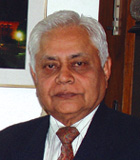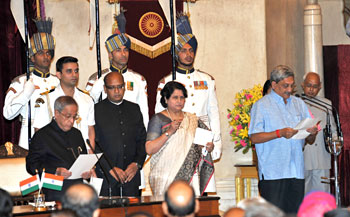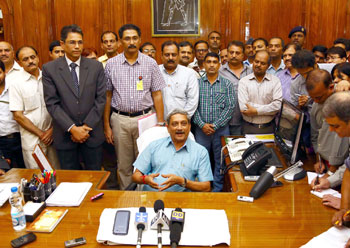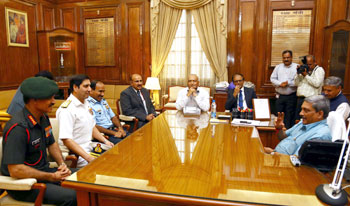INDIAN ARMED FORCES CHIEFS ON OUR RELENTLESS AND FOCUSED PUBLISHING EFFORTS

The insightful articles, inspiring narrations and analytical perspectives presented by the Editorial Team, establish an alluring connect with the reader. My compliments and best wishes to SP Guide Publications.

"Over the past 60 years, the growth of SP Guide Publications has mirrored the rising stature of Indian Navy. Its well-researched and informative magazines on Defence and Aerospace sector have served to shape an educated opinion of our military personnel, policy makers and the public alike. I wish SP's Publication team continued success, fair winds and following seas in all future endeavour!"

Since, its inception in 1964, SP Guide Publications has consistently demonstrated commitment to high-quality journalism in the aerospace and defence sectors, earning a well-deserved reputation as Asia's largest media house in this domain. I wish SP Guide Publications continued success in its pursuit of excellence.
- MoD initiates comprehensive review of Defence Acquisition Procedure 2020, pushes for defence reforms
- G7: The Swansong
- Kalinga Connect: South Asia to Polynesia
- Advanced MRSAM for India for a greater firepower
- Must Credit DRDO for Operation Sindoor, now what is next for defence R&D?
- Operation Sindoor | Day 2 DGMOs Briefing
- Operation Sindoor: Resolute yet Restrained
Mandate for the Defence Minister
 |
By Air Marshal B.K. Pandey (Retd) Former Air Officer Commanding-in-Chief of Training Command, IAF |



The former Chief Minister of Goa Manohar Parrikar has taken over as the Minister of Defence at a time when the nation is confronted with serious and formidable challenges. The first and foremost is that the security environment especially in India's immediate neighbourhood has been deteriorating. Secondly, while both China and Pakistan continue to bolster their military power, the Indian armed forces have been severely handicapped on account of perpetual shortage of military hardware across the board resulting in serious erosion of combat potential. Efforts by the three services to modernise speedily and build up the capability not only to fight a two-front war, but also to safeguard the national security interests that transcend well beyond our borders, have so far not been successful. This to some extent, is attributable to a tedious Defence Procurement Procedure (DPP) which has proved to be merely a clerical exercise for the Ministry of Defence and has clearly failed to address the imperatives of national security.
The indigenous defence and aerospace industry has failed to deliver and during the decade long tenure of the UPA government, efforts at procurement of military hardware from foreign sources have been repeatedly frustrated by scams and allegations of misdemeanor. These resulted in agonising delays in procurement, investigations that demolished well established reputations, cancellations of contracts and indiscriminate blacklisting of defence and aerospace firms of global standing.
To begin with, the new Minister of Defence will have to address the problem of not only critical shortages of equipment but also of human resource. He must work to restore the status of those in uniform and to achieve this, he would need to interact proactively with the Seventh Pay Commission to make the Indian armed forces an attractive and an honourable career option for the youth of the nation. In order to speed up the process of modernisation, the Minister must strive to enhance the budgetary allocation for defence from the current 1.75 percent of GDP to a minimum of three per cent, a level recommended by several Parliamentary Committees on Defence in the past. The Minister would need to bear in mind that on defence, rival China spends around 7.5 per cent of its GDP and even Pakistan a failed state, spends in excess of five percent.
The Minister will have to ensure that a number of contracts for the Indian Air Force (IAF) that have been inordinately delayed are finalised without further delay. These would include the long pending contracts for the 126 Rafale Medium Multi-Role Combat Aircraft from Dassault Aviation of France, 22 AH 64D Apache attack helicopters and 15 CH 47F Chinook Heavy Lift helicopters, both from Boeing as well as for six Airbus A-330 Multi-Role Tanker Transport aircraft from Airbus Military. Apart from these, there are a number other contracts such as for field artillery for the Indian Army , submarines for the Indian Navy and supporting weapon systems for the IAF.
But most importantly, the Minister would have to review and possibly replace the existing DPP with a system that delivers. While it will not be easy to wish away wrong doing in defence procurement contracts, the Minister must institute a system wherein 'crime' is separated from 'contract' and handled in a manner that the former does not impinge on the latter to the detriment of national security. In the business of defence procurement as in other regimes, it is imprudent to believe that 'middlemen' can be done away with. It would be more practical to accept this reality and restructure policies to exploit its advantage rather than allow defence deals to run aground on account of a rigid and unwise policy framework.
The Minister must also examine the issue of 'Blacklisting' of firms, an exercise that was a favourite pastime of the Minister of Defence during the tenure of the previous government. While this may have appeared expedient and perhaps a seemingly effective way to deal with defaulting firms, the implications of such a step on the inventories of the Indian armed forces is debilitating. As was the experience during the UPA regime, 'Blacklisting' of reputed global defence and aerospace companies actually amounted to shooting oneself in the foot!
And finally, the Minister will have to revitalise the India defence and aerospace industry in the public sector, impose higher accountability and make them deliver. The private sector must be provided a level playing field to compete shoulder-to-shoulder with the public sector. This will be a mandate for the Minister that would be in sync with the 'Make in India' philosophy propagated by the Prime Minister.





